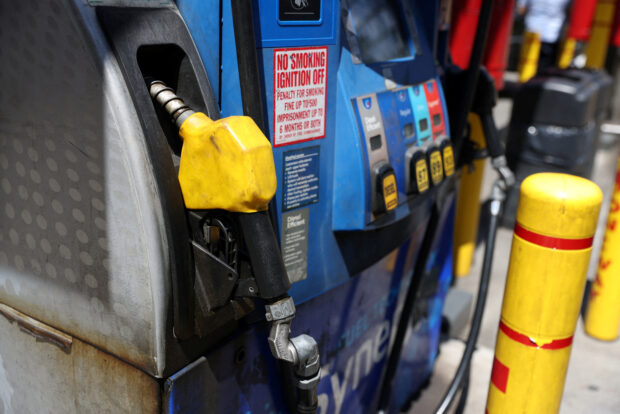
A pump is seen at a gas station in Manhattan, New York City, U.S., Aug 11, 2022. REUTERS/Andrew Kelly/File photo
LONDON -Oil prices rose on Thursday after data showed U.S. crude stockpiles fell more than expected last week, while the Chinese central bank’s cut in banks’ reserve ratio reinforced hopes of more stimulus measures and economic recovery.
Brent crude futures were up 97 cents, or 1.2 percent, to $81.01 a barrel at 0955 GMT, while U.S. West Texas Intermediate crude was up $1.03, or 1.4 percent, to $76.12 a barrel.
“A significant drop in the U.S. oil inventories and expectations of China’s economic recovery and more stimulus measures supported oil prices,” said Toshitaka Tazawa, an analyst at Fujitomi Securities.
“Tensions in the Middle East were also behind buying,” he added.
U.S. crude stockpiles tumbled by 9.2 million barrels last week, the Energy Information Administration said, while analysts in a Reuters poll had expected a 2.2 million-barrel draw.
READ: Oil prices rise on big draw in US stocks, China stimulus hopes
The draw was driven by a stark drop in U.S. crude imports as winter weather shut in refineries and kept motorists off the road.
U.S. crude output fell from a record-tying 13.3 million barrels per day (bpd) two weeks ago to a five-month low of 12.3 bpd last week after oil wells froze.
China banks’ reserve ratio
Oil prices also drew support from hopes for China’s economic recovery.
China’s central bank announced a deep cut in bank reserves on Wednesday, in a move that will inject about $140 billion of cash into the banking system and send a strong signal of support for a fragile economy and plunging stock markets.
READ: READ: Oil prices flat as extreme cold’s hit to US output offsets China data
Meanwhile, geopolitical tensions in the Middle East remained in focus, though price gains were capped as risk premiums have already been priced in, said Priyanka Sachdeva, senior market analyst at brokerage firm Phillip Nova.
“There is no actual damage done to crude oil supplies … it’s mere anticipation that the Red Sea contagion will lead to further disruption in oil flow from the producing region,” Sachdeva said.
In the latest shipping incident, Maersk said nearby explosions forced two ships operated by its U.S. subsidiary and carrying U.S. military supplies to turn around when they were transiting the Bab al-Mandab Strait off Yemen.

